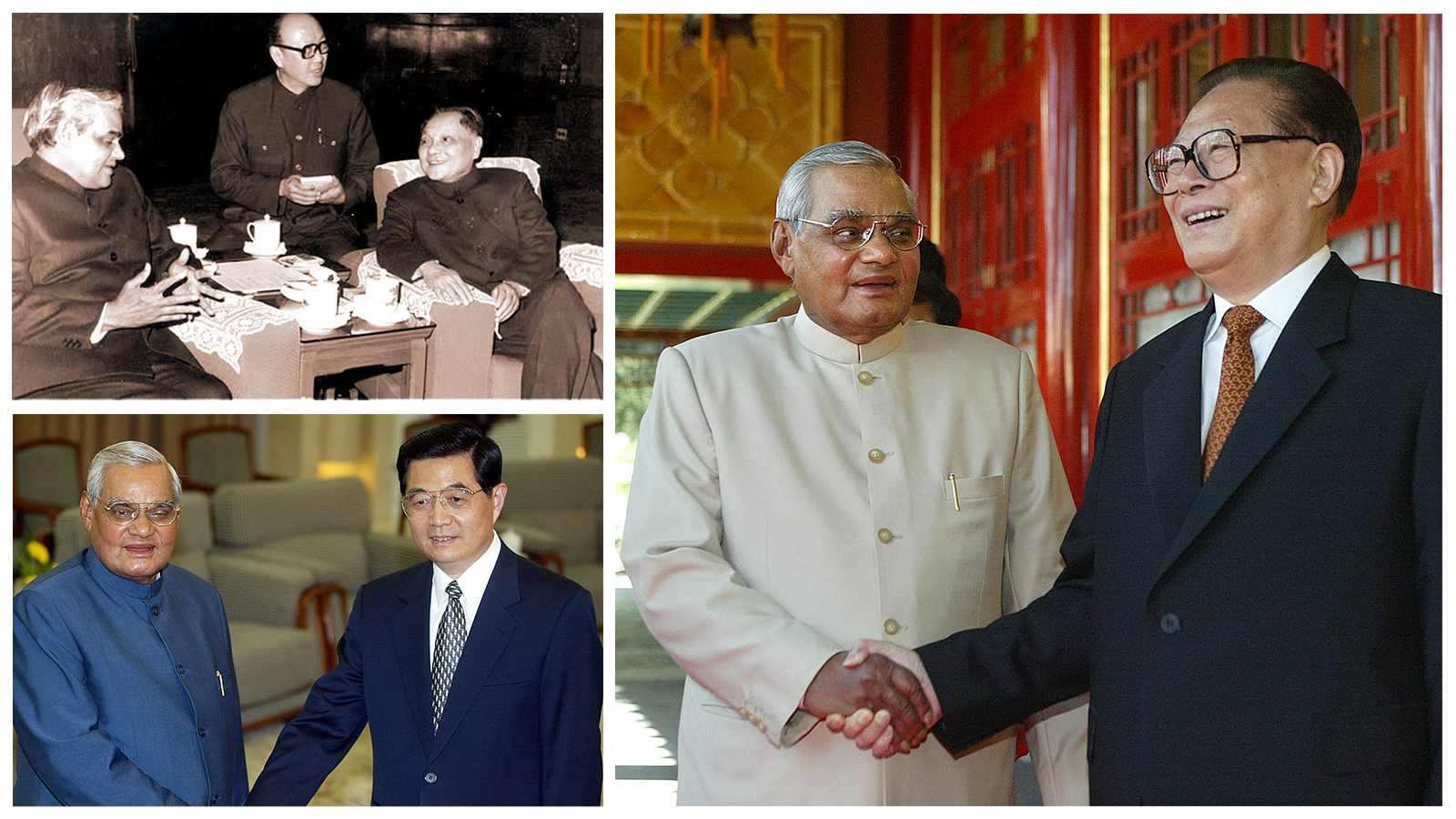“As two of the world’s largest and most populous developing countries, India and China should remain in close touch on global issues of concern to developing countries,” former Indian Prime Minister Atal Bihari Vajpayee said during his landmark visit to China in 2003, setting the foundation of cooperation between the Asian neighbors that has led to a range of bilateral and multilateral engagements ever since.
Vajpayee, who passed away in a New Delhi hospital on Thursday, is widely seen by analysts as among the key architects of India’s foreign policy, particularly leaving a lasting legacy in India-China relations. An astute statesman known for his oratory, Vajpayee was among a handful of Indian leaders respected even by his political opponents.
“Deeply saddened by the passing away of the Honorable Atal Bihari Vajpayee. We will never forget his great contribution to China-India relations,” Chinese Ambassador to India Luo Zhaohui tweeted, offering his tribute to the deceased leader.
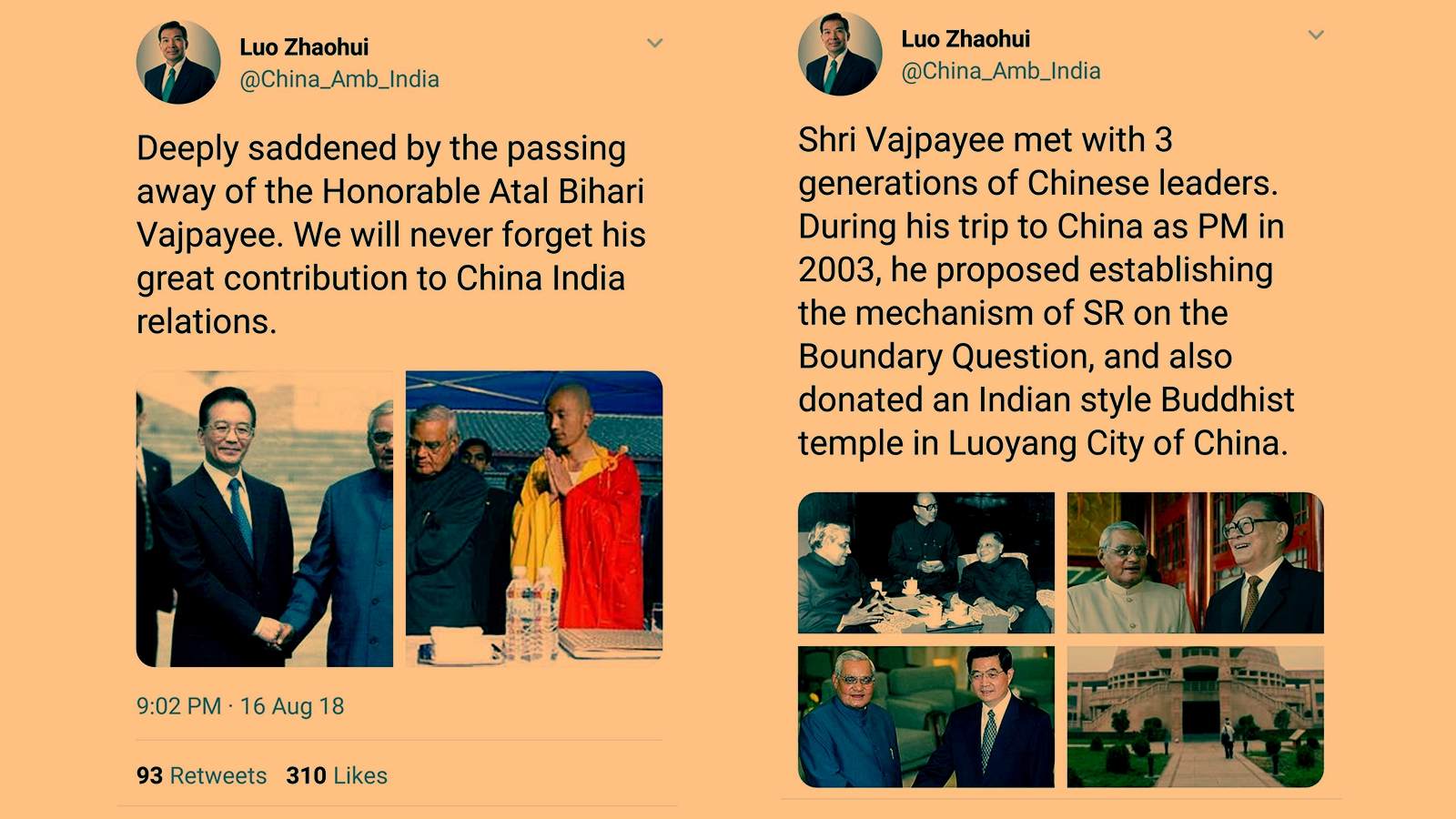
Screenshots of tweets by Luo Zhaohui, Chinese Ambassador to India, condoling the death of former Indian Prime Minister Atal Bihari Vajpayee.
Screenshots of tweets by Luo Zhaohui, Chinese Ambassador to India, condoling the death of former Indian Prime Minister Atal Bihari Vajpayee.
“Shri (an Indian honorific equivalent in meaning to Sir) Vajpayee met with three generations of Chinese leaders. During his trip to China as PM in 2003, he proposed establishing the mechanism of SR (special representative) on the Boundary Question, and also donated an Indian style Buddhist temple in Luoyang City of China,” he added, sharing a few old photographs from Vajpayee’s two visits to China.
"The death of Vajpayee is a great loss to China-India relations. Vajpayee played an important role in the normalization of Sino-Indian ties, and his visit to China in 1979 was a landmark event in this regard," Lin Minwang, an international relations professor at Shanghai-based Fudan University, told CGTN Digital.
"Similarly, his visit in 2003 after he became prime minister injected new impetus to Sino-Indian relations after the Cold War," Lin added, echoing the sentiments expressed by Luo.
"The sincerity and political drive Vajpayee has shown in his diplomacy towards China are admirable. The development of Sino-Indian relations in the new era gives us the reason to adhere to the path of peace and development initiated by Prime Minister Vajpayee," the Chinese professor said.
'Breaking the ice'
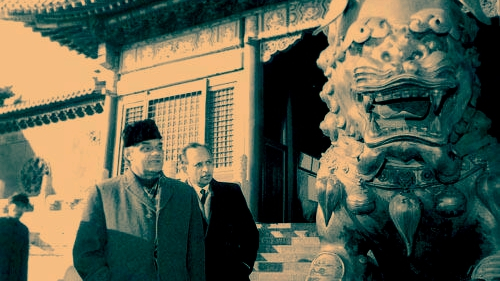
Atal Bihari Vajpayee visited Beijing as India's foreign minister in February 1979. /Photo via Embassy of China, New Delhi
Atal Bihari Vajpayee visited Beijing as India's foreign minister in February 1979. /Photo via Embassy of China, New Delhi
The Indian leader first visited China, as his country’s foreign minister, in February 1979 after a long period of chill in the bilateral relationship following the China-India border war of 1962.
During the path-breaking visit, Vajpayee held wide-ranging talks with top members of the Chinese leadership including Premier Hua Guofeng, Vice Premier Deng Xiaoping and Foreign Minister Huang Hua.
While that visit was cut short as the Sino-Vietnamese war broke out, Vajpayee was able to unfreeze the issue of China-India boundary question while agreeing that tranquility should be maintained along the border.
“Vajpayee as foreign minister in 1979 had succeeded in breaking the ice,” remarked Yashwant Sinha, who served as the foreign minister between 2002 and 2004 under Vajpayee’s prime ministership.
Ushering in a new phase of ties
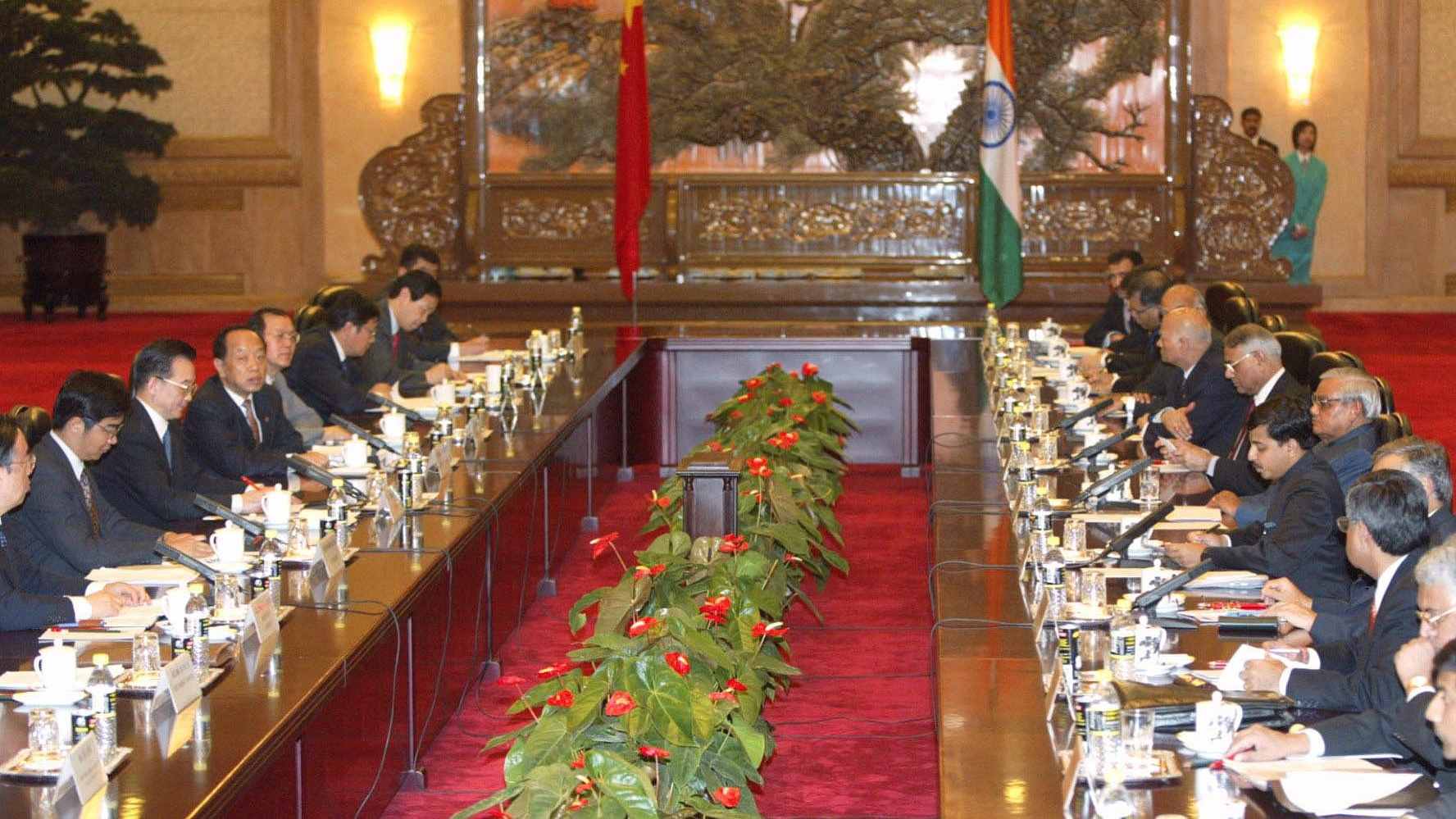
Chinese Premier Wen Jiabao and Indian Prime Minister Atal Bihari Vajpayee lead their respective delegations at a meeting during the latter's visit to Beijing in June 2003. /VCG Photo
Chinese Premier Wen Jiabao and Indian Prime Minister Atal Bihari Vajpayee lead their respective delegations at a meeting during the latter's visit to Beijing in June 2003. /VCG Photo
In June 2003, 24 years after his first China trip, Vajpayee as the prime minister of India arrived in Beijing on a historic state visit at the invitation of Chinese Premier Wen Jiabao.
It was the first visit to China by an Indian prime minister in over a decade and came after yet another frosty diplomatic period following India’s nuclear tests in 1998 under the Vajpayee government.
However, the landmark state visit - that resulted in the signing of the Declaration on Principles for Relations and Comprehensive Cooperation - is widely seen as ushering in a new phase of China-India bilateral ties. Both sides also signed 11 pacts to improve political, economic and social relations.
"The common interests of the two sides outweigh their differences. The two countries are not a threat to each other. Neither side shall use or threaten to use force against the other,” the declaration emphasized.
“Both sides agree to qualitatively enhance the bilateral relationship at all levels and in all areas while addressing differences through peaceful means in a fair, reasonable and mutually acceptable manner. The differences should not be allowed to affect the overall development of bilateral relations," it added.
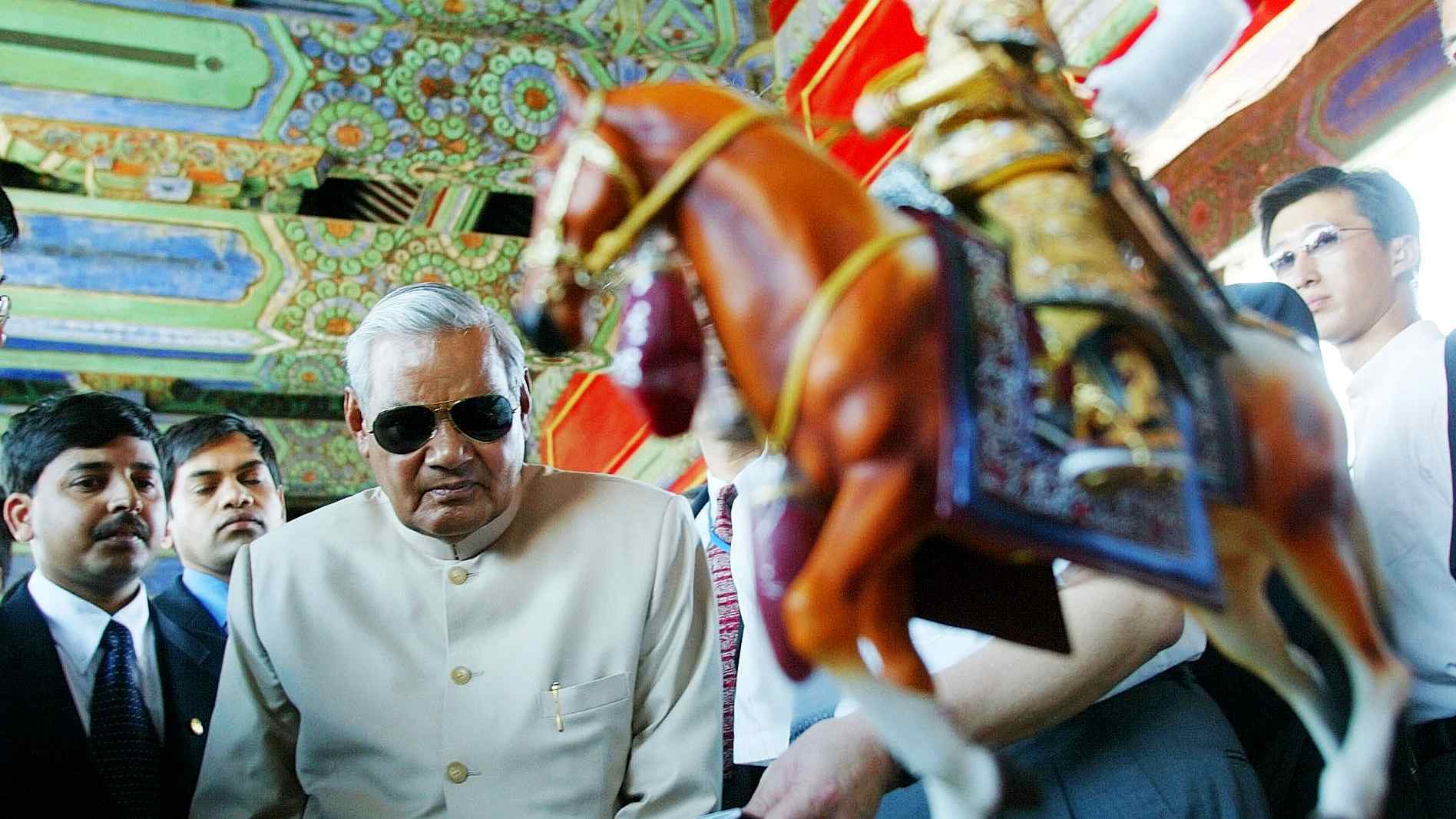
Indian Prime Minister Atal Bihari Vajpayee looks at a gift named "Portrait of the Qing Emperor Qianlong Reviewing" for him by the Forbidden City in Beijing, China on June 24, 2003. /VCG Photo
Indian Prime Minister Atal Bihari Vajpayee looks at a gift named "Portrait of the Qing Emperor Qianlong Reviewing" for him by the Forbidden City in Beijing, China on June 24, 2003. /VCG Photo
Besides holding talks with Wen, Vajpayee also held discussions with Chinese President Hu Jintao, and other senior Chinese officials.
Vajpayee also proposed establishing the mechanism for talks between Special Representatives (SRs) on both sides for resolving the border issue, which was accepted by China. This led to the creation of the SR mechanism, under which 20 rounds of talks have been held so far, the last of which was hosted by New Delhi in December 2017.
The Indian leader's creative proposal "played an important role in the search for a solution to the border issue and in maintaining strategic communication between the two countries," said Pref. Lin.
“This time it has been the beginning of a new era,” Sinha said of Vajpayee’s 2003 visit.
When Wen surprised the 'poet-PM'
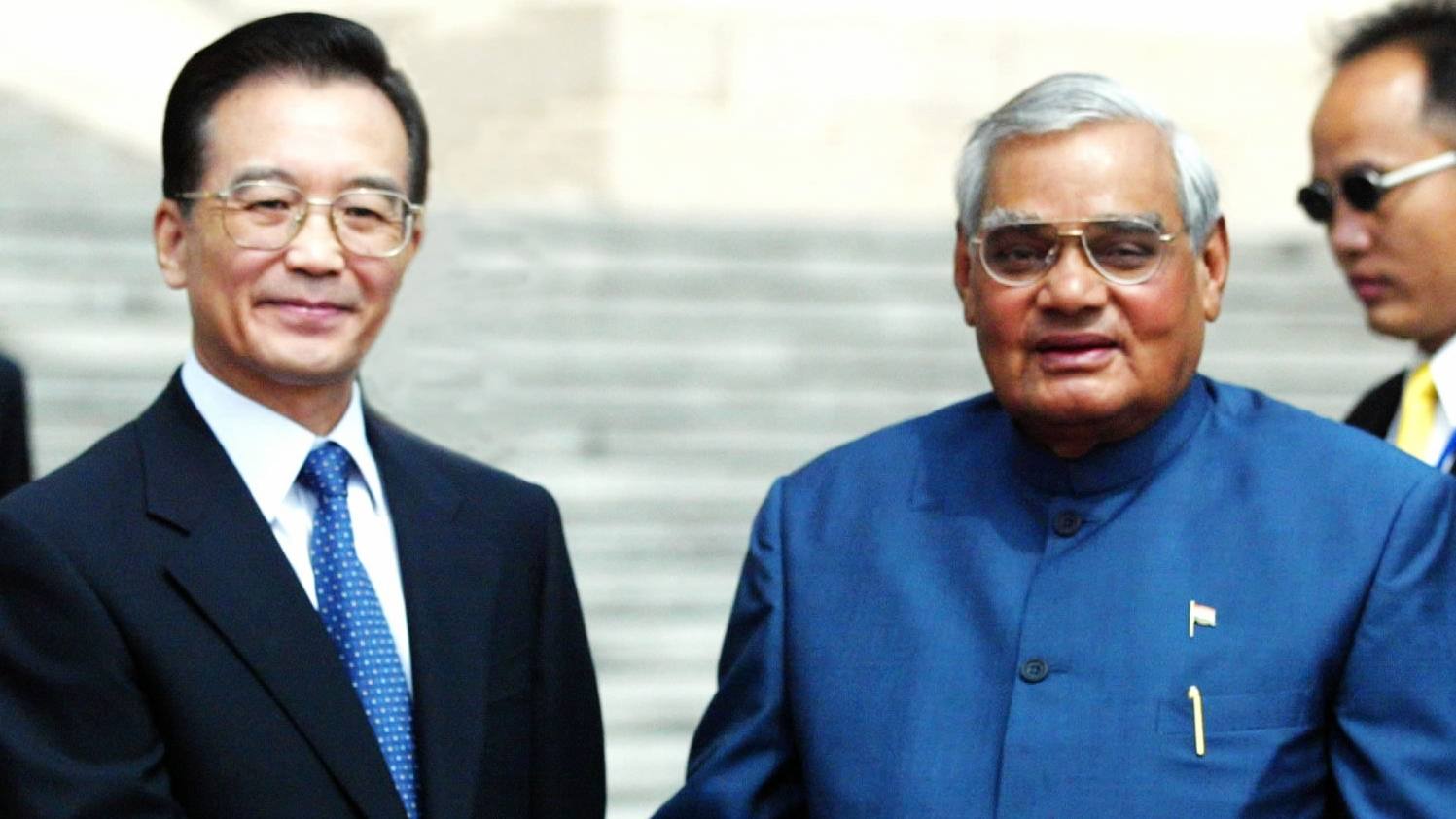
Chinese Premier Wen Jiabao (left) and his Indian counterpart Atal Bihari Vajpayee during a welcoming ceremony outside the Great Hall of the People in Beijing, China on June 23, 2003. /VCG Photo
Chinese Premier Wen Jiabao (left) and his Indian counterpart Atal Bihari Vajpayee during a welcoming ceremony outside the Great Hall of the People in Beijing, China on June 23, 2003. /VCG Photo
The Indian leader, who was a distinguished orator and a poet, was surprised by Wen who during one of their deliberations reportedly recited the Chinese translation of one of Vajpayee’s poems aptly titled ‘Jung Na Hone Denge’ (We will not allow war).
“Our two countries jointly defined the five principles of mutual cooperation (known as Panchsheel in Hindi) about 50 years ago as the basis of relations between sovereign, independent countries. With a commitment to Panchsheel, respecting equality, and with mutual sensitivity to the concerns of each other, our two countries can construct an enduring and powerful partnership,” Vajpayee said in an interview to China’s Xinhua news agency in 2003.
'In search for a multi-polar world'’
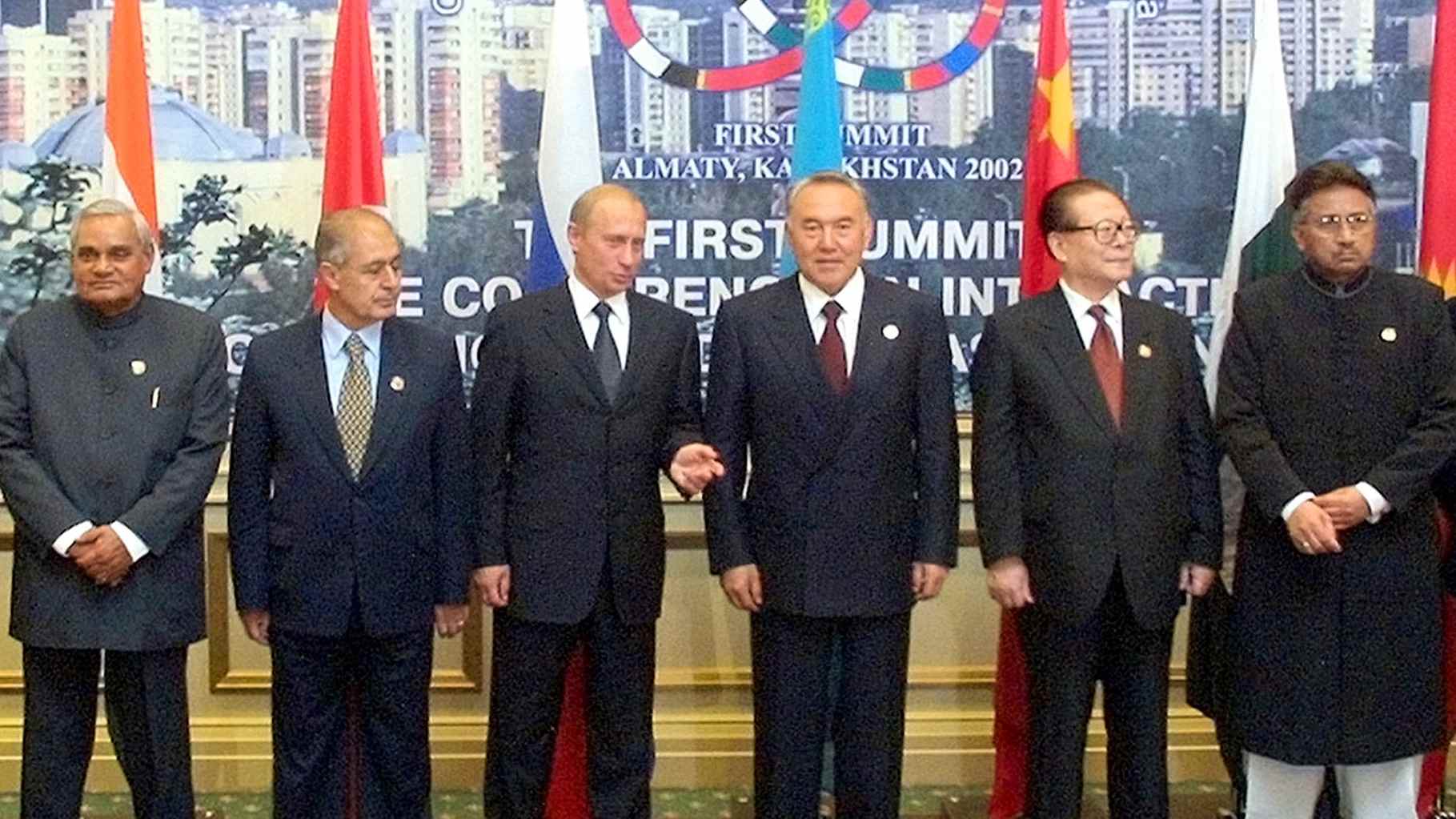
From left: Indian Prime Minister Atal Bihari Vajpayee, Turkish President Ahmet Necdet Sezer, Russian President Vladimir Putin, Kazakhstan's President Nursultan Nazarbayev, Chinese President Jiang Zemin and Pakistani President Gen. Pervez Musharraf pose for a picture during the 16-nation Conference on Interaction and Confidence-Building Measures in Asia, in the Kazakh city of Almaty, on June 4, 2002. /AP Photo
From left: Indian Prime Minister Atal Bihari Vajpayee, Turkish President Ahmet Necdet Sezer, Russian President Vladimir Putin, Kazakhstan's President Nursultan Nazarbayev, Chinese President Jiang Zemin and Pakistani President Gen. Pervez Musharraf pose for a picture during the 16-nation Conference on Interaction and Confidence-Building Measures in Asia, in the Kazakh city of Almaty, on June 4, 2002. /AP Photo
The Indian statesman was also a strong proponent of a multi-polar world order, and following the historic 2003 China visit, many geo-strategic analysts predicted that the stage was set for enhanced strategic cooperation and coordination between Beijing and New Delhi on global issues for a new international political and economic order
“But for two countries, which together have one-third of humanity, we have only taken the first few steps. We need to do much more to fulfill the true potential of our partnership – in the search for a multi-polar world order, in fashioning pragmatic responses to the challenges of globalization, and in promoting a climate of peace, stability and development in Asia and in the world,” Vajpayee had told Xinhua.
Since 2003, the two Asian neighbors have seen a significant jump in bilateral engagements as well as their joint participation in multilateral forums such as the BRICS (the grouping of five emerging economies – Brazil, Russia, India, China and South Africa) and the Shanghai Cooperation Organization (SCO).
Trivia: Vajpayee was quite a foodie in his private life and had a special fondness for Chinese food, according to Indian media reports. He loved eating prawns, and Chinese was his favorite cuisine.
[Cover: Atal Bihari Vajpayee is seen with China's former vice premier Deng Xiaoping and former Chinese presidents Jiang Zemin and Hu Jintao during the Indian leader's visits to China in 1979 and 2003 respectively. /Photos via AP and Embassy of China, New Delhi]

